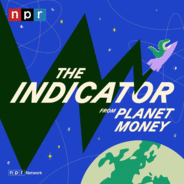Act now to ensure public media remains free and accessible to all. Your donation will help this essential American service survive and thrive. Visit donate.npr.org now.Learn more about sponsor message choices: podcastchoices.com/adchoicesNPR Privacy Policy

Wirtschaft
The Indicator from Planet Money Folgen
A bite-sized show about big ideas. From the people who make Planet Money, The Indicator helps you make sense of what's happening in today's economy. It's a quick hit of insight into money, work, and business. Monday through Friday, in 10 minutes or less.
Folgen von The Indicator from Planet Money
300 Folgen
-
Folge vom 18.07.2025Congress has voted to eliminate government funding for public media
-
Folge vom 18.07.2025Are you not entertained ... by our movie-related indicators?The movies come to Indicators of the Week. We dig into why one film is letting you reserve tickets a whole year in advance, what ticket prices might tell us about tariffs and inflation, and how Los Angeles might be cutting back on the red tape when it comes to making movies there. Related episodes: Why aren't filmmakers shooting in LA? (Apple / Spotify) The story of China and Hollywood's big-screen romance (Apple / Spotify) When is cosplay a crime? (Apple / Spotify) Before La La Land, there was Fort Lee, New Jersey (Apple / Spotify) For sponsor-free episodes of The Indicator from Planet Money, subscribe to Planet Money+ via Apple Podcasts or at plus.npr.org. Fact-checking by Julia Ritchey. Music by Drop Electric. Find us: TikTok, Instagram, Facebook, Newsletter. Learn more about sponsor message choices: podcastchoices.com/adchoicesNPR Privacy Policy
-
Folge vom 17.07.2025When is cosplay a crime?Cosplay—or dressing up as your favorite character from pop culture—is fun! But it can fall into a legal gray area when it comes to companies' intellectual property. Today on the show: a group of cosplayers, Lucasfilm(!), a lawyer, and finding economic symbiosis in order to express yourself. Related episodes:Before La La Land there was Fort Lee, New Jersey (Apple / Spotify)Why aren't filmmakers shooting in LA? (Apple / Spotify)For sponsor-free episodes of The Indicator from Planet Money, subscribe to Planet Money+ via Apple Podcasts or at plus.npr.org.Fact-checking by Sierra Juarez. Music by Drop Electric. Find us: TikTok, Instagram, Facebook, Newsletter. Learn more about sponsor message choices: podcastchoices.com/adchoicesNPR Privacy Policy
-
Folge vom 16.07.2025The story of China and Hollywood's big-screen romanceNo country can come close to the amount of money Americans spend at the box office each year ... that is, until China came along. The US and Chinese film industries have a long intertwined history, with shifting power dynamics. Today on the show, we continue our week-long look at the movie business as we explore the on-and-off romance between Hollywood and China's film industries. Related episodes:Why aren't filmmakers shooting in LA? (Apple / Spotify)Before La La Land there was Fort Lee, New Jersey (Apple / Spotify)For sponsor-free episodes of The Indicator from Planet Money, subscribe to Planet Money+ via Apple Podcasts or at plus.npr.org.Fact-checking by Sierra Juarez. Music by Drop Electric. Find us: TikTok, Instagram, Facebook, Newsletter. Learn more about sponsor message choices: podcastchoices.com/adchoicesNPR Privacy Policy
